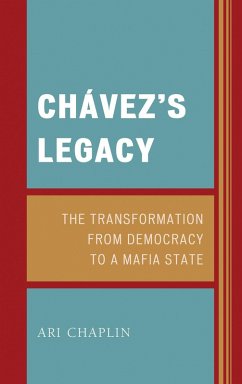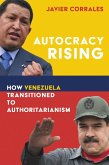33,95 €
inkl. MwSt.
Sofort per Download lieferbar

17 °P sammeln
- Format: PDF
- Merkliste
- Auf die Merkliste
- Bewerten Bewerten
- Teilen
- Produkt teilen
- Produkterinnerung
- Produkterinnerung

Bitte loggen Sie sich zunächst in Ihr Kundenkonto ein oder registrieren Sie sich bei
bücher.de, um das eBook-Abo tolino select nutzen zu können.
Hier können Sie sich einloggen
Hier können Sie sich einloggen
Sie sind bereits eingeloggt. Klicken Sie auf 2. tolino select Abo, um fortzufahren.

Bitte loggen Sie sich zunächst in Ihr Kundenkonto ein oder registrieren Sie sich bei bücher.de, um das eBook-Abo tolino select nutzen zu können.
Chavez's Legacy: The Transformation from Democracy to a Mafia State refutes the claim that Chavez's regime corrected the errors of Soviet Communism. This book traces Venezuela's communist transformation and its effects on the neighboring nations of Bolivia, Ecuador, and Nicaragua. This book also examines Chavez's behavior in the international arena, strongly emphasizing his close association with Iran and narcotics terrorism.
- Geräte: PC
- mit Kopierschutz
- eBook Hilfe
- Größe: 1.38MB
Andere Kunden interessierten sich auch für
![Chávez's Legacy (eBook, ePUB) Chávez's Legacy (eBook, ePUB)]() Ari ChaplinChávez's Legacy (eBook, ePUB)33,95 €
Ari ChaplinChávez's Legacy (eBook, ePUB)33,95 €![Socio-Political Dynamics within the Crisis of the Left (eBook, PDF) Socio-Political Dynamics within the Crisis of the Left (eBook, PDF)]() Socio-Political Dynamics within the Crisis of the Left (eBook, PDF)91,95 €
Socio-Political Dynamics within the Crisis of the Left (eBook, PDF)91,95 €![Latin America's Radical Left (eBook, PDF) Latin America's Radical Left (eBook, PDF)]() Latin America's Radical Left (eBook, PDF)32,95 €
Latin America's Radical Left (eBook, PDF)32,95 €![Latin America since Independence (eBook, PDF) Latin America since Independence (eBook, PDF)]() Thomas C. WrightLatin America since Independence (eBook, PDF)25,95 €
Thomas C. WrightLatin America since Independence (eBook, PDF)25,95 €![Autocracy Rising (eBook, PDF) Autocracy Rising (eBook, PDF)]() Javier CorralesAutocracy Rising (eBook, PDF)19,95 €
Javier CorralesAutocracy Rising (eBook, PDF)19,95 €![Presidential Leadership in the Americas since Independence (eBook, PDF) Presidential Leadership in the Americas since Independence (eBook, PDF)]() Guy BurtonPresidential Leadership in the Americas since Independence (eBook, PDF)31,95 €
Guy BurtonPresidential Leadership in the Americas since Independence (eBook, PDF)31,95 €![Capital, Power, and Inequality in Latin America and the Caribbean (eBook, PDF) Capital, Power, and Inequality in Latin America and the Caribbean (eBook, PDF)]() Capital, Power, and Inequality in Latin America and the Caribbean (eBook, PDF)41,95 €
Capital, Power, and Inequality in Latin America and the Caribbean (eBook, PDF)41,95 €-
-
-
Chavez's Legacy: The Transformation from Democracy to a Mafia State refutes the claim that Chavez's regime corrected the errors of Soviet Communism. This book traces Venezuela's communist transformation and its effects on the neighboring nations of Bolivia, Ecuador, and Nicaragua. This book also examines Chavez's behavior in the international arena, strongly emphasizing his close association with Iran and narcotics terrorism.
Produktdetails
- Produktdetails
- Verlag: Bloomsbury eBooks US
- Seitenzahl: 266
- Erscheinungstermin: 26. November 2013
- Englisch
- ISBN-13: 9780761886365
- Artikelnr.: 74398581
- Verlag: Bloomsbury eBooks US
- Seitenzahl: 266
- Erscheinungstermin: 26. November 2013
- Englisch
- ISBN-13: 9780761886365
- Artikelnr.: 74398581
- Herstellerkennzeichnung Die Herstellerinformationen sind derzeit nicht verfügbar.
Ari Chaplin has taught courses in comparative politics, Latin American history, and terrorism at various colleges in the New York City Metropolitan area. He also served as an educational consultant for the RMC Corporation in New York City. His book Terror: The New Theater of War was published by University Press of America.
Contents
Foreword
Preface
Introduction
Chapter One: What is Bolivarism?
1. Simon Bolivar-A Legend Intended to Legitimize Chávez's Regime
2. The War for People's Minds: Mass Media and Education in Chávez's
Venezuela
3. Is Bolivarism a Totalitarian/Authoritarian Movement?
4. Is Chávez the New Lenin of Latin America?
5. Is Bolivarism Similar to Fascism/Nazism?
6. Civil-Military Relations in Chávez's Venezuela
7. Church-State Relations: The Case of Chávez's Venezuela
8. Comparing Two Models of Political Development: Democratic Versus
Authoritarian
9. The Cubanization of Venezuela
10. External Enemies and the Domestic Sphere
Chapter Two: The Economic Aspects of Chávezism
1. The Ideological Foundations of Chávez's Economic Policies
2. A Critical View of Chávez's Economic Policies
3. Chávez's Oil Policy: The Subordination of Petroleum Activity to
Political and Ideological Considerations
4. Expropriation: A Gradual path to Communism
5. Is Inflation an Integral Part of Socialism?
6. Other Characteristics of Chávez's Economic Policy
7. The Chilean Way (Sebastian Pinera) Versus the Venezuelan Way (Hugo
Chávez)
8. Venezuela and Israel: Transformation from Capitalism to Socialism and
the Reverse
Chapter Three: Chávez's Foreign Policy: Primary Objective-
Expansion of His Ideology
1. Chávez's Views and Behavior in the International System
2. Chávez's First Step in Spreading his Ideology-The Creation
of the Bolivarian Alliance of the People of Our America (ALBA)
3. Beyond ALBA: Chávez's Attempts to Spread His Ideology
Throughout Latin America
4. Chávez's Puppet States: Bolivia, Ecuador, and Nicaragua
5. Venezuela's Chávez and Iran's Cooperation in International Terrorism
6. Chávez and Narcotic-Terrorism
Conclusion: The Transformation from Democracy to Mafia States
Index
Foreword
Preface
Introduction
Chapter One: What is Bolivarism?
1. Simon Bolivar-A Legend Intended to Legitimize Chávez's Regime
2. The War for People's Minds: Mass Media and Education in Chávez's
Venezuela
3. Is Bolivarism a Totalitarian/Authoritarian Movement?
4. Is Chávez the New Lenin of Latin America?
5. Is Bolivarism Similar to Fascism/Nazism?
6. Civil-Military Relations in Chávez's Venezuela
7. Church-State Relations: The Case of Chávez's Venezuela
8. Comparing Two Models of Political Development: Democratic Versus
Authoritarian
9. The Cubanization of Venezuela
10. External Enemies and the Domestic Sphere
Chapter Two: The Economic Aspects of Chávezism
1. The Ideological Foundations of Chávez's Economic Policies
2. A Critical View of Chávez's Economic Policies
3. Chávez's Oil Policy: The Subordination of Petroleum Activity to
Political and Ideological Considerations
4. Expropriation: A Gradual path to Communism
5. Is Inflation an Integral Part of Socialism?
6. Other Characteristics of Chávez's Economic Policy
7. The Chilean Way (Sebastian Pinera) Versus the Venezuelan Way (Hugo
Chávez)
8. Venezuela and Israel: Transformation from Capitalism to Socialism and
the Reverse
Chapter Three: Chávez's Foreign Policy: Primary Objective-
Expansion of His Ideology
1. Chávez's Views and Behavior in the International System
2. Chávez's First Step in Spreading his Ideology-The Creation
of the Bolivarian Alliance of the People of Our America (ALBA)
3. Beyond ALBA: Chávez's Attempts to Spread His Ideology
Throughout Latin America
4. Chávez's Puppet States: Bolivia, Ecuador, and Nicaragua
5. Venezuela's Chávez and Iran's Cooperation in International Terrorism
6. Chávez and Narcotic-Terrorism
Conclusion: The Transformation from Democracy to Mafia States
Index
Contents
Foreword
Preface
Introduction
Chapter One: What is Bolivarism?
1. Simon Bolivar-A Legend Intended to Legitimize Chávez's Regime
2. The War for People's Minds: Mass Media and Education in Chávez's
Venezuela
3. Is Bolivarism a Totalitarian/Authoritarian Movement?
4. Is Chávez the New Lenin of Latin America?
5. Is Bolivarism Similar to Fascism/Nazism?
6. Civil-Military Relations in Chávez's Venezuela
7. Church-State Relations: The Case of Chávez's Venezuela
8. Comparing Two Models of Political Development: Democratic Versus
Authoritarian
9. The Cubanization of Venezuela
10. External Enemies and the Domestic Sphere
Chapter Two: The Economic Aspects of Chávezism
1. The Ideological Foundations of Chávez's Economic Policies
2. A Critical View of Chávez's Economic Policies
3. Chávez's Oil Policy: The Subordination of Petroleum Activity to
Political and Ideological Considerations
4. Expropriation: A Gradual path to Communism
5. Is Inflation an Integral Part of Socialism?
6. Other Characteristics of Chávez's Economic Policy
7. The Chilean Way (Sebastian Pinera) Versus the Venezuelan Way (Hugo
Chávez)
8. Venezuela and Israel: Transformation from Capitalism to Socialism and
the Reverse
Chapter Three: Chávez's Foreign Policy: Primary Objective-
Expansion of His Ideology
1. Chávez's Views and Behavior in the International System
2. Chávez's First Step in Spreading his Ideology-The Creation
of the Bolivarian Alliance of the People of Our America (ALBA)
3. Beyond ALBA: Chávez's Attempts to Spread His Ideology
Throughout Latin America
4. Chávez's Puppet States: Bolivia, Ecuador, and Nicaragua
5. Venezuela's Chávez and Iran's Cooperation in International Terrorism
6. Chávez and Narcotic-Terrorism
Conclusion: The Transformation from Democracy to Mafia States
Index
Foreword
Preface
Introduction
Chapter One: What is Bolivarism?
1. Simon Bolivar-A Legend Intended to Legitimize Chávez's Regime
2. The War for People's Minds: Mass Media and Education in Chávez's
Venezuela
3. Is Bolivarism a Totalitarian/Authoritarian Movement?
4. Is Chávez the New Lenin of Latin America?
5. Is Bolivarism Similar to Fascism/Nazism?
6. Civil-Military Relations in Chávez's Venezuela
7. Church-State Relations: The Case of Chávez's Venezuela
8. Comparing Two Models of Political Development: Democratic Versus
Authoritarian
9. The Cubanization of Venezuela
10. External Enemies and the Domestic Sphere
Chapter Two: The Economic Aspects of Chávezism
1. The Ideological Foundations of Chávez's Economic Policies
2. A Critical View of Chávez's Economic Policies
3. Chávez's Oil Policy: The Subordination of Petroleum Activity to
Political and Ideological Considerations
4. Expropriation: A Gradual path to Communism
5. Is Inflation an Integral Part of Socialism?
6. Other Characteristics of Chávez's Economic Policy
7. The Chilean Way (Sebastian Pinera) Versus the Venezuelan Way (Hugo
Chávez)
8. Venezuela and Israel: Transformation from Capitalism to Socialism and
the Reverse
Chapter Three: Chávez's Foreign Policy: Primary Objective-
Expansion of His Ideology
1. Chávez's Views and Behavior in the International System
2. Chávez's First Step in Spreading his Ideology-The Creation
of the Bolivarian Alliance of the People of Our America (ALBA)
3. Beyond ALBA: Chávez's Attempts to Spread His Ideology
Throughout Latin America
4. Chávez's Puppet States: Bolivia, Ecuador, and Nicaragua
5. Venezuela's Chávez and Iran's Cooperation in International Terrorism
6. Chávez and Narcotic-Terrorism
Conclusion: The Transformation from Democracy to Mafia States
Index







